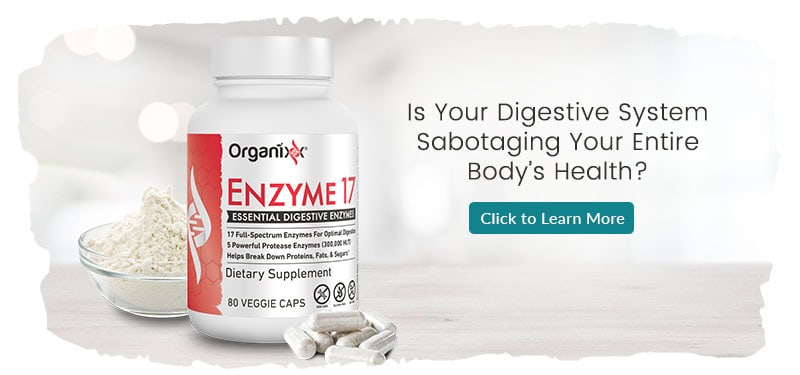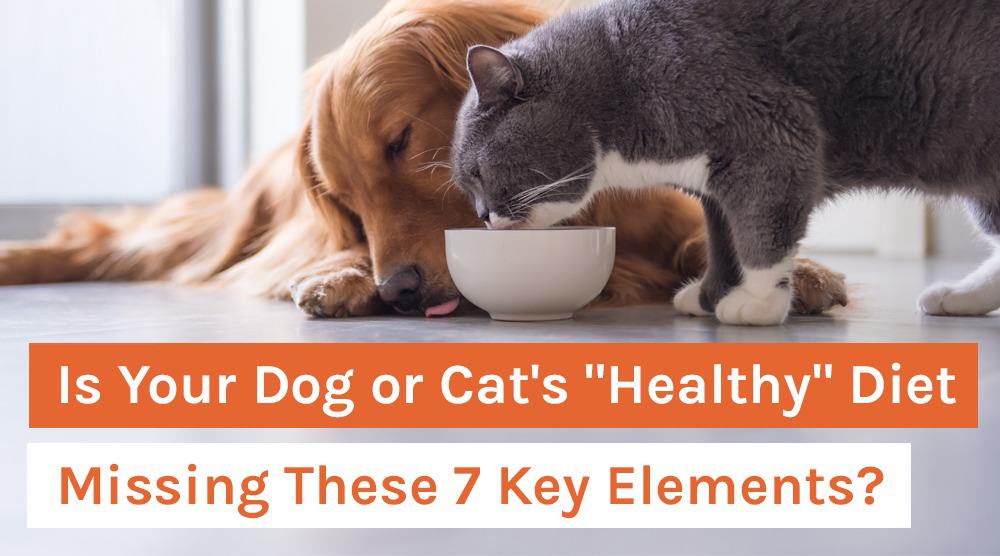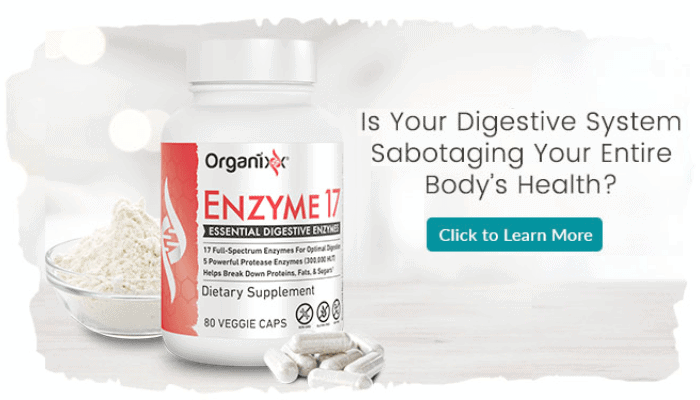Is Your Dog or Cat's "Healthy" Diet Missing These 7 Key Elements?
In a hurry? Click here to read the Article Summary...
Dog and cat food comes in all shapes, flavors, varieties, and formulas. But it might surprise you to learn that even high-end dog and cat food brands that you assume are “healthy” are often still missing one vital ingredient… enzymes.
In fact, much of the pet food on store shelves is lacking in at least seven unique enzyme types that are critical for healthy digestion and absorption of nutrients. Enzymes are inherently delicate and very easily damaged or destroyed by heat and other factors [1].
Enzymes are typically absent from anything that’s been cooked or processed – including most major pet food brands on the market today. This is a serious problem. Without enzymes in their diets, dogs and cats are deprived of an important energetic substance that directly contributes to [2]:
- proper nourishment
- sustained energy production
- vibrant immunity
- healthy body weight
- sturdy teeth and gums
- balanced detoxification
- strong bones and joints
All of these are vital for your four-legged friend to live a long and vivacious life.
Without Enzymes, Pet’s Bodies Are Forced to Compensate
 There are essentially two classes of enzyme that dogs and cats need for optimal health [3]:
There are essentially two classes of enzyme that dogs and cats need for optimal health [3]:
- digestive enzymes
- metabolic enzymes
The two are very similar, with the primary difference being that digestive enzymes are supposed to come from food, while metabolic enzymes are manufactured inside the body.
When animals consume what they were designed to eat (living foods that haven’t been cooked or otherwise altered), they get plenty of digestive enzymes naturally.
This allows the metabolic enzymes to perform their respective duties. Unfortunately, most pets aren’t given the raw food diets of their wild ancestors, and their bodies need to adjust to make up for the enzyme deficiency.
Metabolic enzymes can be repurposed to serve as digestive enzymes when necessary. Your pet’s body can produce a finite (limited) amount of enzymes before exhausting itself and depleting its internal stores. This is when problems like digestive dysfunction start to arise, which can eventually progress into various chronic diseases.
This grim scenario is obviously something that every pet owner wants to avoid, which is why it’s critical to take action before the situation spirals out of control. This requires either completely revamping your pet’s diet to include more raw and native foods, or actively supplementing it with digestive enzymes in order to fill the nutritional gap.
A Healthy Diet for Dogs & Cats Requires Enzymes
Not everyone has the time and budget to prepare a well-balanced raw food diet for their pet on a daily basis. Many conscious pet owners choose to enhance their pets’ existing diets with a high-quality enzyme supplement, making them more nutritionally complete.
But what, exactly, constitutes a high-quality enzyme supplement? And more specifically, which enzymes are most critical for the health of your pet?
It all starts with the four basic types of digestive enzymes: amylase, protease, lipase, and cellulose [4].
#1: Amylase, an enzyme primarily found in saliva and pancreatic fluid that’s responsible for converting starches and glycogens into simple sugars. In essence, amylase catalyzes the conversion of carbohydrates into smaller monosaccharides like glucose, fructose, and galactose that a pet’s body can actually absorb. These monosaccharides travel through the intestines into the blood and liver, where they’re transformed into a usable source of energy.
If your pet pal seems to lack energy on a regular basis, this could be a sign of an amylase deficiency. This is because carbohydrates consumed aren’t being broken down into their simplest and most usable forms for energy production. Other common symptoms of amylase deficiency include skin rashes, constipation and gas, and blood sugar problems [5], which represent many of the same symptoms associated with other enzyme deficiencies.
#2: Protease, or proteolytic enzyme, is responsible for hydrolyzing, or breaking down, the peptide bonds of food proteins in amino acids. Amino acids are the basic building blocks of proteins that a pet’s body utilizes for basically every essential biological process. Whether it’s generating new cell tissue, building muscle mass, manufacturing hormones, or balancing fat stores, amino acids are there to make it happen [6].
#3: Lipase is the enzyme responsible for breaking down lipids, which are also known as fats. In the presence of triglycerides, lipase works alongside liver bile to split fat molecules into their base components, which include fatty acids and monoglycerides: two fundamental fat compounds that function as backup sources of energy for a pet’s body, as well as fuel for the central nervous, endocrine, and cardiovascular systems [7].
#4: Cellulase is an enzyme that tackles the breakdown and assimilation of vegetable fibers and other cellular material found in plants. Like other enzymes, it converts larger, less-absorbable substances into smaller, more absorbable substances. Unlike amylase, protease, and lipase, cellulase isn’t produced inside a pet’s body at all, which means it has to be supplemented through nutrition.
You may be surprised to learn that your pet may not be getting everything they need from their food. Watch this video to learn more about the seven critical nutrients that are likely missing from your pet’s diet.
#5: Bromelain is another digestive enzyme similar to protease that helps ease the burden of breaking down proteins. Most commonly found in the flesh and stems of pineapples, bromelain has been found to support healthy inflammation levels, help relieve pain, reduce swelling, and boost wound healing [8].
A 2010 mouse study published in the journal Inflammatory Bowel Disease reported that bromelain given to mice with colitis “decreases inflammation severity and the incidence and multiplicity of inflammation-associated colonic neoplasiahas [9].”
#6: Xylanase plays a more distinct enzymatic role, breaking down a very specific type of fiber known as hemicellulose, found in vegetable and plant matter, into a simple sugar known as xylose. Xylanase works to produce more food matter for the beneficial bacteria that live inside a pet’s gut, as this collective microbiome is responsible for extracting and assimilating nutrients while further supporting the digestive process [10].
#7: Beta glucanase is actually a grouping of enzymes that, similar to amylase, is responsible for breaking down carbohydrates. It differs, however, in the fact that it targets a specific type of polysaccharide known as beta glucans that, without the presence of beta glucanase, can’t be digested naturally by your pet’s body.
Beta glucans function as a type of intestinal fiber that helps to promote regularity, balance cholesterol and blood sugar levels. They also prevent the formation of damaging bacterial growths known as “biofilms” that directly contribute to the formation of malignant yeast overgrowths like Candida albicans [11].
Why Your Pet Needs More Enzymes
When all of these powerful enzymes are joined together, they create a digestive army of synergistic crusaders that ensures every last nutrient in your pet’s food is put to good use.
This enzymatic entourage also frees up your pet’s metabolic enzymes to perform their normal functions, rather than picking up the slack of the digestive enzymes that are nowhere to be found in most store-bought kibble.
Remember: Even if the food you give your pet falls on the healthier end of the spectrum, it’s more than likely still deficient in enzymes. That’s why most pets can still benefit greatly when their food is fortified with natural, living enzymes.
Oh, and by the way… people need enzymes too!
Organixx Enzyme 17 contains a whopping FIVE kinds of powerful protease enzymes in combination with one of the most advanced enzyme blends on the planet. It’s scientifically designed to help your body break down and process nutrients for better absorption, digestion, and overall health.

 Sources:
Sources:
Article Summary
Modern pet food is generally lacking in many enzyme types that are critical for healthy digestion & absorption of nutrients.
There are two classes of enzyme that pets need for optimal health: digestive enzymes and metabolic enzymes.
7 enzymes most critical for the health of your pet:
- Amylase
- Protease
- Lipase
- Cellulose
- Bromelain
- Xylanase
- Beta glucanase






Great article. Thank you so much for sharing this.
You're welcome, Reymark! We are glad to hear that you enjoyed reading this article. We hope you found them informative and interesting.
Thank you for the feedback and we wish you a great day!
My dog is on hymopathic for heartworm ( we live in Aus) also non toxic spray and color for flees and ticks.
Her diet is grated raw vegetables with either chicken or turkey raw mainly . She has a tiin of sardines in spring water with raw veg once a week.
My last dog Molly i made meat loaf s for her similar ingredients as above but did not know back then if you cooks their vegetables you must rinse several times in water as there is ( a cemical releashed from the veg when cooked) Molly levels of this were extremely high. Molly had acute Kidney Failure from consuming something toxic to her system. This is why Lucy has mainly raw food diet.
Hello all the way to Australia, Carolyn!
We loved reading about your dogs and how two different types of diet can definitely affect their health in the long run. Thank you for sharing your experience and story with us.
We are sorry for your loss (Molly) and wish you and Lucy the best!
I love organixx and am wondering if, what dose of enzymes/probiotics to use for dogs? mthx
Thanks for the love and for your question, Sharon.
We highly suggest a consultation with a trusted veterinarian in order to determine the suggested dose of enzyme or probiotics for your dog, which will depend on their breed/size/age/etc.
You may use the following links to use as your reference if you are doing your own online research or if you want to ask your veterinarian about OrganiZymes:
1. OrganiZymes Page: https://organixx.com/organizymes/
2. OrganiZymes FAQ: https://support.organixx.com/727211-OrganiZymes
3. OrganiZymes Label: https://cdn.shopify.com/s/files/1/1569/1827/products/OrganiZymes-back-label-green_1024x1024.png?v=1501695891
We hope this helped and we wish you a great day ahead!
What foods should i NOT feed my cat and what is best for them to eat. Should vegetables be cooked. Are fresh fruits and vegetables good and how do i get a cat to eat them. Can you recommend a food that is nutritionally complete. Have four picky cats. Feeding them wet friskies and pet supplies plus dry food. There coats do not look shinny and healthy. Also is there something i can give my cat for itching. Not sure if food or allergies
Hello Jo, thank you for your questions. Organixx cannot diagnose, treat, or give you advice regarding your pet's health and individual use of our products. It would be best to consult with a veterinarian to help you with your cat's dietary and grooming concerns. We wish you and your cat the best!
I can’t believe how many screens I had to bypass to get to the end. Obviously I do not own a pet. J. H.
Thanks for leaving feedback, J.H. We hope you found the article informative, even if you are not a pet owner. Have a great day ahead!